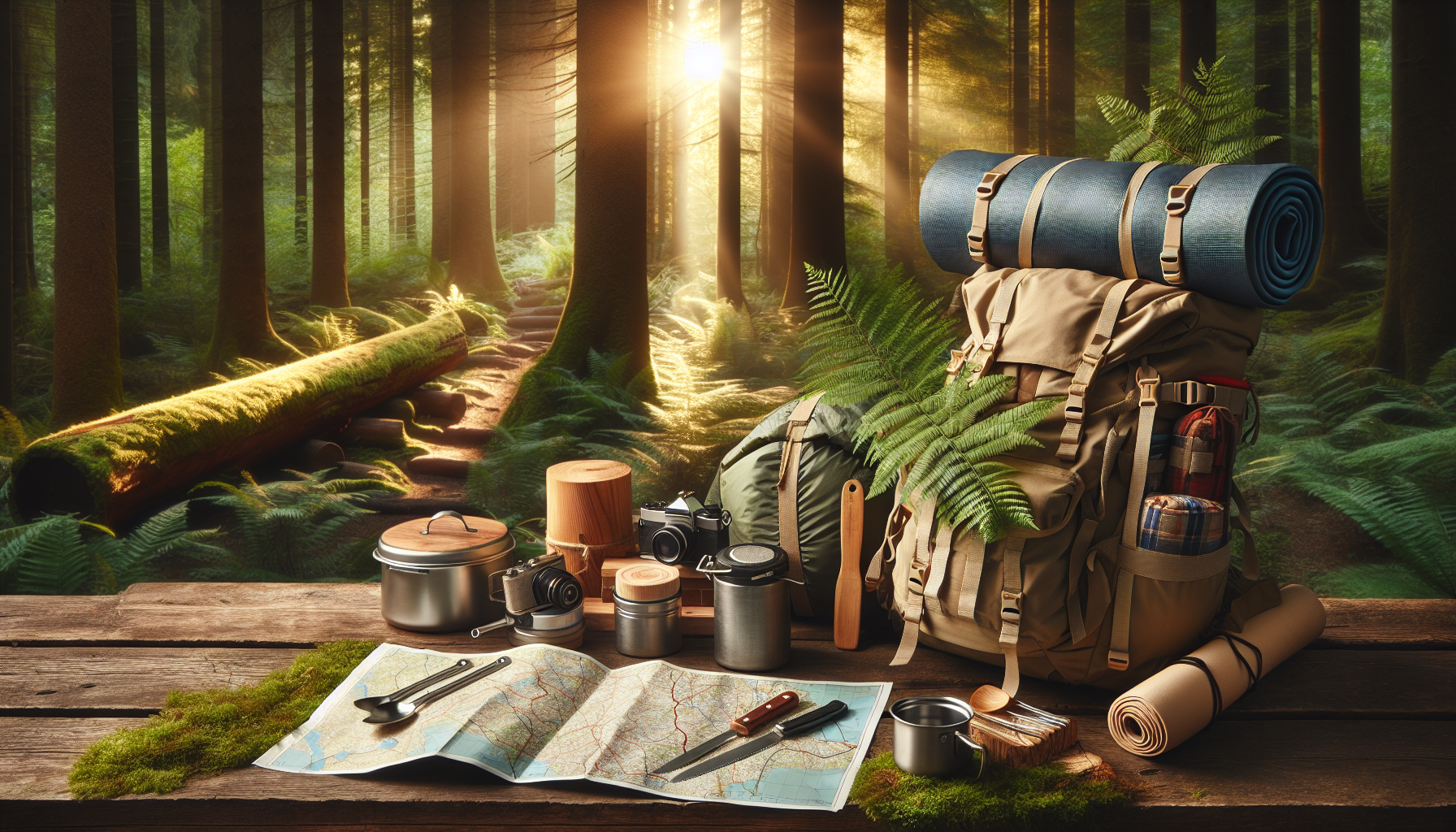Let’s face it, we all love a good adventure in the great outdoors, but our wallets? Well, they might not be as thrilled. That’s why we’ve got the inside scoop on dollar-smart camping, where you can embrace your inner nature enthusiast without breaking the bank. From savvy packing hacks to finding the perfect campsite, we’ve got you covered on all the budget-friendly tips for your next outdoor escapade. So grab your backpack and get ready to explore the wild while keeping those precious dollars in your pocket.
Choosing the Right Campground
When it comes to choosing the perfect campground for our outdoor adventure, there are a few factors we always consider: location, cost, and amenities. After all, we want to make sure we have a memorable and comfortable experience without breaking the bank.
Location
Finding a campground in a convenient location is essential. We want to be close enough to our desired outdoor activities, such as hiking trails or fishing spots, without spending hours on the road. Proximity to nearby towns or attractions can also be a plus, in case we need any last-minute supplies or feel like exploring the area.
Cost
Budget-minded campers like us are always on the lookout for affordable options. Fortunately, there are plenty of campgrounds to choose from that won’t break the bank. We keep an eye out for any discounts or promotions offered by campgrounds, especially during off-peak seasons when rates tend to be lower. Additionally, some campgrounds offer discounted rates for longer stays, so we always inquire about those options.
Amenities
While we love reconnecting with nature and embracing a simpler lifestyle while camping, we appreciate certain amenities that make our experience more comfortable. Basic amenities such as clean restrooms and showers are a must, as well as access to potable water. Some campgrounds even offer amenities like electricity hookups, laundry facilities, or Wi-Fi. We weigh the importance of these amenities based on our needs and budget.
Types of Camping Accommodations
Camping offers a variety of accommodation options to suit different preferences and budgets. Let’s take a closer look at three popular types: tent camping, RV camping, and cabin camping.
Tent Camping
For us, there’s nothing quite like the experience of tent camping. It allows us to truly immerse ourselves in nature and disconnect from the hustle and bustle of daily life. Tent camping is generally the most budget-friendly option, as it only requires basic camping gear such as a tent, sleeping bags, and cooking equipment. Plus, setting up and taking down a tent is a great team-building activity!
RV Camping
If we’re looking for a bit more comfort and convenience, RV camping is a fantastic choice. Renting or owning an RV provides us with a home on wheels, complete with a kitchen, bathroom, and sleeping quarters. While RV camping can be a bit pricier due to the necessary vehicle maintenance and fuel costs, it offers the benefit of flexibility and the ability to travel to different campgrounds with ease.
Cabin Camping
For those seeking a middle ground between tent and RV camping, cabin camping is an excellent option. Many campgrounds offer cozy cabins equipped with basic amenities, such as beds, electricity, and even kitchenettes. While cabin rentals tend to be more expensive than tent camping, they eliminate the need to set up tents and provide a more comfortable sleeping arrangement. It’s like having a rustic home away from home!

This image is property of images.pexels.com.
Rent versus Buy Gear
One of the key considerations when planning a camping trip is whether to rent or buy camping gear. Each option has its pros and cons, and we always weigh them carefully before making a decision.
Pros and Cons of Renting Camping Gear
Renting camping gear can be a cost-effective solution for occasional campers or those who prefer not to invest in their own equipment. The main advantage is the ability to try out different gear and brands without committing to a purchase. Additionally, renting eliminates the need for storing and maintaining bulky gear when not in use. However, rental fees can add up over time, and there may be limitations in terms of availability, quality, or customization options.
Where to Rent Camping Gear
When deciding to rent camping gear, we explore local outdoor gear rental shops, online rental platforms, or even ask fellow campers if they have any recommendations. It’s important to compare prices, read reviews, and check the condition of the gear before finalizing the rental.
Pros and Cons of Buying Camping Gear
Investing in our own camping gear provides us with the freedom and convenience of having everything readily available whenever we want to head out on an adventure. It allows us to personalize our gear according to our preferences and needs. While the initial cost of purchasing camping gear can be significant, it can save us money in the long run, especially if we are frequent campers. The downside is that we need storage space for the gear and may have to deal with maintenance and repairs.
Tips for Buying Affordable Camping Gear
When it comes to buying camping gear without breaking the bank, we always keep an eye out for sales, discounts, or secondhand options. Online marketplaces, thrift stores, or garage sales can be treasure troves for finding affordable gear. Additionally, we prioritize essential items like a sturdy tent and sleeping bags and gradually build our gear collection over time.
Meal Planning and Food Prep
No camping trip is complete without delicious meals cooked in the great outdoors. With a bit of pre-planning and creativity, we can enjoy budget-friendly and tasty food while surrounded by nature.
Meal Planning Tips
Before heading out, we create a meal plan that takes into account the duration of our trip, the number of campers, and any dietary restrictions. We focus on meals that require simple ingredients and minimal preparation. One-pot meals, foil-wrapped packets, and pre-cut vegetables are our go-to options. We also pack versatile ingredients that can be used for multiple meals, such as eggs, pasta, and canned foods.
Budget-Friendly Camping Recipes
Cooking on a budget doesn’t mean compromising on taste and variety. We’ve mastered a few camping recipes that are not only easy to make but also light on the wallet. Some of our favorites include foil-wrapped sausages and vegetables, campfire chili, and breakfast burritos. These meals require minimal ingredients and can be prepared over a campfire or portable stove.
Packaged Meals versus Homemade Meals
While pre-packaged meals and convenience foods can be tempting for their ease of preparation, we prefer homemade meals for their affordability and freshness. Packaged meals can quickly add up in cost, especially when feeding a group. By preparing our own meals, we have control over the ingredients and portion sizes, allowing us to save money and reduce waste.
Food Packing and Storage Tips
When it comes to packing food for our camping trip, we prioritize durable and lightweight options. We opt for non-perishable food items that require minimal refrigeration, as some campgrounds may have limited access to ice or electricity. Ziplock bags, airtight containers, and coolers with ice packs are essential for keeping our food fresh, organized, and safe from wildlife. Plus, they help us avoid unnecessary food waste.

This image is property of images.pexels.com.
Campfire Cooking on a Budget
There’s something magical about cooking over a campfire. Not only does it create a warm and cozy ambiance, but it also allows us to whip up delicious meals without the need for a fully-equipped kitchen. Here are some tips for budget-friendly campfire cooking.
Choosing Cost-Effective Ingredients
When planning our campfire meals, we opt for simple and budget-friendly ingredients that are readily available. Staples like potatoes, corn on the cob, and beans can be cooked directly in the campfire and are versatile enough to be used in various dishes. Additionally, we look for local produce at farmer’s markets or roadside stands, which often offer better prices and support local communities.
Budget-Friendly Campfire Cooking Equipment
Investing in a few essential campfire cooking tools can go a long way in creating delicious meals. We keep it simple with a sturdy cast-iron skillet or Dutch oven, long-handled grilling tools, and aluminum foil for foil-wrapped packets. These versatile tools allow us to cook a wide range of dishes, from breakfast scrambles to hearty stews.
Simple and Delicious Campfire Recipes
Campfire cooking doesn’t have to be complicated. We’ve discovered a repertoire of simple and tasty recipes that require minimal ingredients and preparation. Some favorites include campfire nachos, foil-wrapped fish with vegetables, and grilled peaches with honey and cinnamon. These recipes allow us to enjoy gourmet meals without the gourmet price tag.
Water and Hygiene on a Budget
Staying hydrated and maintaining good hygiene are essential aspects of any camping trip. Here’s how we handle water and hygiene without breaking the bank.
Water Sources and Filtration
When it comes to water, we always prioritize safety and cleanliness. Many campgrounds provide access to potable water, and we make sure to fill up any containers or water jugs before heading to our campsite. If potable water isn’t available, we carry a portable water filter or water purification tablets to ensure that the water we collect from natural sources is safe to drink. This allows us to save money on purchasing bottled water.
Budget-Friendly Hygiene Essentials
Camping doesn’t mean sacrificing cleanliness. We pack budget-friendly hygiene essentials such as biodegradable soap, toothpaste, and shampoo. These products not only minimize our environmental impact but also save us money in the long run. Additionally, we bring microfiber towels that dry quickly, reducing the need for multiple towels and saving space in our backpacks.
Eco-Friendly Hygiene Practices
Being mindful of our impact on the environment is important to us. We practice Leave No Trace principles by disposing of waste properly, using designated restrooms, and leaving our campsite cleaner than we found it. We also opt for eco-friendly hygiene products and avoid using single-use items when possible. It’s a win-win for the planet and our wallets.

This image is property of images.pexels.com.
Entertainment and Activities
Camping is not just about relaxing in nature; it’s also an opportunity to engage in fun activities and entertainment without spending a fortune.
Outdoor Activities with Minimal Costs
Nature provides us with a vast playground of free and enjoyable activities. Hiking, fishing, and birdwatching are just a few examples of outdoor activities that require little to no cost. We make sure to research the local area before our trip and identify any nearby trails, lakes, or scenic spots that we can explore. It’s a great way to connect with nature and get some exercise at the same time.
Free or Low-Cost Entertainment Ideas
Camping offers a unique chance to unplug from technology and embrace simpler forms of entertainment. We bring along board games, playing cards, and books to enjoy during downtime. Stargazing is another favorite activity that costs nothing but provides endless wonder. Many campgrounds also organize communal activities or campfire storytelling, allowing us to socialize with fellow campers and create lasting memories.
DIY Camping Crafts and Games
To inject some creativity into our camping experience, we occasionally plan DIY crafting sessions or games. We gather materials like sticks, pinecones, and rocks to create nature-inspired crafts such as leaf prints or dreamcatchers. When it comes to games, we organize scavenger hunts or outdoor obstacle courses using items found in nature. These activities provide entertainment while fostering a deeper connection with the natural surroundings.
Tips for Saving Money on Transportation
Getting to our camping destination doesn’t have to be costly. Here are a few tips for saving money on transportation.
Carpooling or Car Sharing
If we’re traveling with a group, carpooling or car sharing is a fantastic option for reducing transportation costs. Sharing the fuel expenses among several people can make a significant difference. We often coordinate with friends or fellow campers who are heading in the same direction to minimize our carbon footprint and save money.
Public Transportation Options
For those without access to a private vehicle, exploring public transportation options can be a money-saving solution. Many campgrounds are accessible via public buses or trains. By planning the journey in advance and checking schedules, we can reach our camping destination without the need for a personal vehicle. It’s an adventure within an adventure!
Bicycle or Walking Distances
For the more adventurous souls among us, biking or walking to the campground can be an excellent way to save money and embrace an active lifestyle. If the distance allows, we plan a route that is scenic and safe for cycling or walking. It not only saves on transportation costs but also adds a unique element of physical challenge to our camping trip.

Dealing with Seasons and Off-Peak Times
Choosing the right time to go camping can significantly impact our budget. Here’s how we take advantage of off-peak times and seasonal discounts.
Off-Peak Camping Benefits
Camping during off-peak seasons offers numerous benefits. Firstly, campgrounds tend to be less crowded, allowing us to enjoy a more peaceful and secluded experience. Additionally, rates are often lower during off-peak times, making it easier to find budget-friendly options. Shoulder seasons, in particular, offer pleasant weather and fewer insects, making it an ideal time for camping.
Seasonal Discounts and Promotions
Many campgrounds offer seasonal discounts or promotions to attract campers during slower periods. By keeping an eye out for special deals, we can secure discounted rates or additional amenities, such as free firewood or extended check-out times. Signing up for campground newsletters or following them on social media is a great way to stay updated on any upcoming promotions.
Mindful and Sustainable Camping
As avid campers, we believe in leaving each campsite better than we found it and minimizing our ecological impact. Here’s how we practice mindful and sustainable camping.
Leave No Trace Principles
We always follow the Leave No Trace principles when camping. These principles remind us to leave nature undisturbed, pack out all trash, minimize campfire impacts, and respect wildlife. By following these guidelines, we help preserve the natural beauty of the wilderness for future generations to enjoy.
Reduce, Reuse, Recycle
We prioritize reducing waste while camping by bringing reusable containers, utensils, and water bottles. We minimize single-use plastic items by opting for eco-friendly alternatives whenever possible. Additionally, we bring separate bags or containers for recycling and dispose of waste in designated areas. It’s a small step towards a greener and cleaner environment.
Eco-Friendly Camping Products
Choosing eco-friendly camping products can have a positive impact on the environment and our wallets. We invest in reusable campfire cookware, solar-powered lanterns, and biodegradable camping soaps. These products not only reduce waste but also save us money in the long run by eliminating the need for single-use items.
By combining these dollar-smart camping tips, we can create unforgettable outdoor experiences without breaking the bank. From choosing the right campground to planning meals and activities on a budget, camping can be an enjoyable and affordable adventure for all. So, gather your gear, pack your sense of humor, and embrace the wonders of nature without worrying about your wallet. Happy camping!


